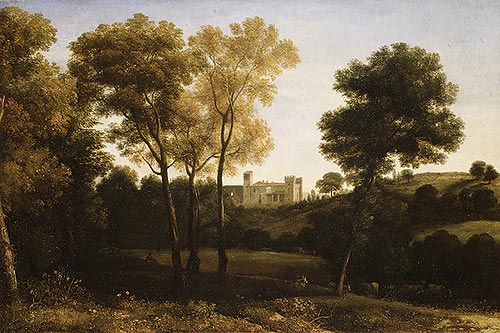 Claude Lorrain,”View of La Crescenza” (1648-50)
Claude Lorrain,”View of La Crescenza” (1648-50)
Poetry enhances our lives in a host of little ways. It did so in a walk I took around campus with my wife last week.
It was a beautiful fall day and we work at a beautiful campus. There is an incline at the edge of college that we climbed. The campus spread before us, with its athletic fields, its Georgian architecture, and the St. Mary’s River winding in the background. Thomas Gray’s “Ode on a Distant Prospect of Eton College” came to mind.
I chose to think of only a portion of the poem, however. I focused on the opening three stanzas where Gray, gazing down at children playing on the green, remembers his childhood years.
Ye distant spires, ye antique towers,
That crown the watery glade,
Where grateful Science still adores
Her Henry’s holy shade;
And ye, that from the stately brow
Of Windsor’s heights the expanse below
Of grove, of lawn, of mead survey,
Whose turf, whose shade, whose flowers among
Wanders the hoary Thames along
His silver-winding way.
Ah, happy hills, ah, pleasing shade,
Ah, fields beloved in vain,
Where once my careless childhood strayed,
A stranger yet to pain!
I feel the gales, that from ye blow,
A momentary bliss bestow,
As waving fresh their gladsome wing,
My weary soul they seem to soothe,
And, redolent of joy and youth,
To breathe a second spring.
Say, Father Thames, for thou hast seen
Full many a sprightly race
Disporting on thy margent green
The paths of pleasure trace,
Who foremost now delight to cleave
With pliant arm thy glassy wave?
The captive linnet which enthrall?
What idle progeny succeed
To chase the rolling circle’s speed,
Or urge the flying ball?
If there had been students involved in a touch football or ultimate Frisbee game, it would have been close to a perfect fit, although Gray’s children are younger.
The poem then takes a grim turn, which I decided to ignore. I’ll just mention two of the most depressing lines in all of poetry. Gray looks into the future and sees oncoming storm clouds, which the children can’t imagine:
Alas, regardless of their doom,
The little victims play!
After a graphic description of their dark prospects, Gray concludes,
Yet ah! why should they know their fate?
Since sorrow never comes too late,
And happiness too swiftly flies.
Thought would destroy their paradise.
No more; where ignorance is bliss,
‘Tis folly to be wise.
The paradox is that what makes this moment so beautiful–the poem’s opening stanzas–is the on-coming storm.
I’ve been thinking about this a lot recently as I spend time with my friend Alan Paskow, who has cancer. Every Sunday evening Julia and I go to visit him and his wife Jackie and our two hours feel like stolen time. Alan and Jackie live in another enchanting locale, a house on an inlet running off of the Potomac River, and as Alan and I gaze out at it and talk about literature and life, we seem to stop what poet Wilfred Owen calls “the steady running of the hour.”
Perhaps to a degree I do cultivate a certain ignorance about the future as we sit in this paradise, thinking that all will be well. After all, the present moment is perfect. ‘Tis folly to be wise indeed.
Note: Claud Lorrain, one of whose paintings I’ve posted to accompany this post, had special significance for the 18th century. Tourists in search of the picaresque would travel to places that Lorrain had depicted and set up special “Lorrain glasses,” which were curved and tinted mirrors, painting size, that would capture the landscape as Lorrain had done so. A study of the practice can be found here.

